

Barbara LeMaster's Preschool Socialization
Gender Research Page


LeMaster's Research: What's it all about?
|
There is nothing in one�s essential gender to bind them to particular
ways of speaking. Instead, to
the extent people affiliate with a gender and want to display themselves
in terms of gender, culturally proscribed ways of speaking may be adopted.
Therefore, it is important to look at how culturally constructed
gendered speech behavior is acquired. The consequence can be great.
While girls generally perform better than boys academically, not
being able to participate in public discourse can ultimately bar them from
full societal participation as adults, and leads to the �30%� rule for
women in public discourse. Ideally, we would hope to be able to use
our findings to propose interventions to help all children gain access to
and maintain the floor in structured teacher-student discourse in an
attempt to be proactive for inclusive participation in public discourse.
In our research, we found that girls who enter preschool as active vocal participants learn to become non-vocal participants in some floor-getting situations within a short period of time. The same effect was not perceived for boys. We are especially concerned with documenting classroom discourse practices which lead to gender-preferential and/or gender-neutral speech. Also, considering that children are not passive recipients of socialization (Thorne 1993) we want to learn how and why they adopt differential rules for classroom behavior based on gender. Ideally, we would hope to be able to use our findings to propose interventions to help all children gain access to and maintain the floor in structured teacher-student discourse in an attempt to be proactive for inclusive participation in public discourse.
|
Discussion
|
Teachers play a big role in helping children acquire culturally sanctioned
classroom discourse habits that favor boys over girls.
We do not believe that the teachers in our data are consciously
employing differential treatment for girls and boys, nor that they are
even aware of these patterns. Instead,
we believe that the teachers are applying their subconscious knowledge of cultural conventions for
perceived appropriate gendered behavior in this
kind of public discourse. Favoring
the male voice in mixed-group public discourse. (Spencer 1980)
It is not surprising to us that these kinds of preferential behaviors towards boy�s inclusion and girl�s exclusion occur in preschool where patriarchal titles for teachers and administrators are still the norm. Female personnel still generally use their male linked titles such as �Miss.� or �Mrs.� Inanimate objects are still called �Mr. Clock,� �Mr. Sun,� and �Mr Owl� and so on. However, it was surprising to us in this research that even though boys and girls bring a certain amount of agency to every situation where they can choose to accept or reject imposed behaviors (Thorne 1993), in a relatively short time, very vocal girls were effectively silenced in these teacher-centered public discourse situations.
Second, more research on the strategies that are used to gain the floor in public discourse settings is vital to making this process more overt for everyone involved.
|
Recommendations
|
We are advocating two areas of applied research focused on intervention.
First, curricula on gender inclusion in classrooms are needed for
university teacher credentialing programs and for in-service training for
teachers. Second, more
research on the strategies that use to gain the floor in public discourse
settings is vital to making this process more overt for everyone involved.
When girls and boys can get the floor equally! |
Chonology of LeMaster's Gender Socialization Research
|
Dr. Barbara LeMaster formed a research group in the Fall of 1997 to work with her on her preschool video tape data. She collected the first set of data in the summer of 1997. She has a Spencer Foundation Grant to collect additional data beginning in the Fall of 2000. The following is a summary of activities:
Fall 1997: Student members included: Megan Hitchcock, Orlando Sanchez, Randall Shigaki, and Tina Werner
November 1997: Megan Hitchcock went to Washington, D.C. with Dr. LeMaster to present the group�s findings at the American Anthropological Association meetings.
April 1998: Orlando Sanchez & Tina Werner went to Berkeley with Dr. LeMaster to co-present the group�s findings at the 5th Berkeley Women and Language Conference � an international meeting. The group�s paper is published in the prestigious proceedings from this meeting, and co-authored with LeMaster by Hitchcock, Sanchez, and Werner, and is titled, �Breaking the Silence: Teaching preschool children how to participate in structured teacher-student interactions.�
Fall 1998: Tina Werner continued to work with Dr. LeMaster, further analyzing hand-raising data. (Tina was graduated in December, and began graduate school at CSULB in Computer Science in the Fall 1999.) Cynthia Nakasuji joined the research team.
Spring 1999: CSULB funded LeMaster preschool research, enabling Cynthia Nakasuji to be hired as a research assistant. Mary Katapodis joined the research team, and developed an elaborate coding scheme hand-raising variation. The team presents their work at Anthropology Day 1999.
Fall 1999: Mary Katapodis continued working on the hand-raising data. LeMaster and Katapodis submit and abstract to the International Gender and Language Association Meeting meetings to be held in Stanford Universal, May 2000.
Spring 2000: Genise Eckles joins the research team. Katapodis and LeMaster continue working on their paper for the IGALA meetings. Katapodis and LeMaster prepare their paper IGALA proceeding, and for publication elsewhere. The team presents their work at CSULB Anthropology Day 2000.
Spring 2001: LeMaster resumes Preschool taping and hires Jenny Yoon as her research assistant. Yoon helps LeMaster coordinate data collection and interview subjects. LeMaster and Yoon begin to work on paper and presentation for IGALA. LeMaster and Katapodis collaborate on another article, which will be included in a Gender Studies Publication.
|
LeMaster's Preschool Gender Socialization Publications
LeMaster and Katapodis presenting at IGALA
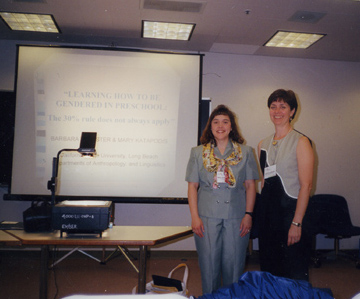 |
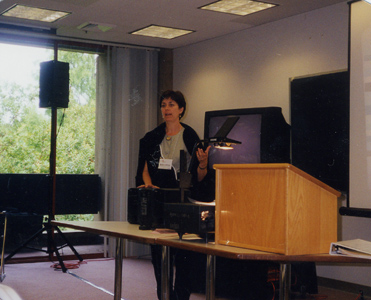 |
LeMaster, Werner, and Sanchez presenting at the Berkeley Women and Language Conference 1999
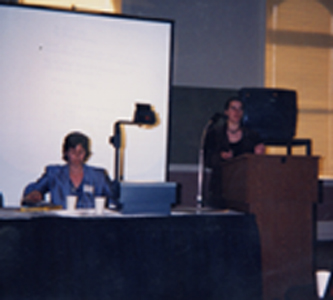 |
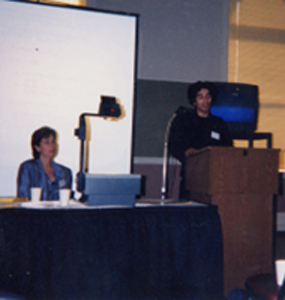 |
Graduate Research Assistants
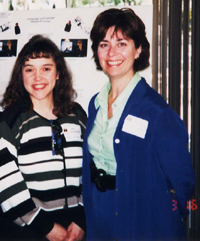 |
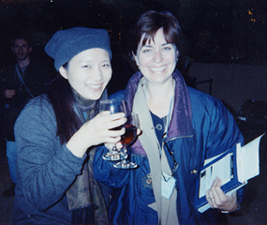 |
| Mary Katapodis and Barbara LeMaster | Jenny Yoon and Barbara LeMaster |